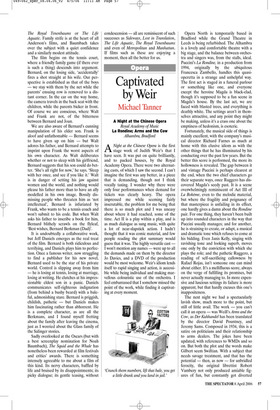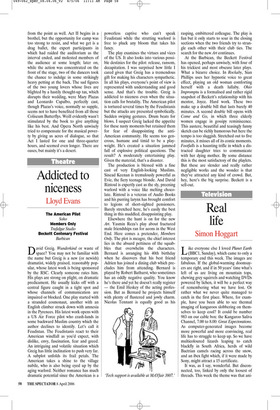Captivated by Weir
Michael Tanner
A Night at the Chinese Opera Royal Academy of Music La Rondine; Arms and the Cow Alhambra, Bradford ANight at the Chinese Opera is the first stage work of Judith Weir’s that I have seen. It was put on quite brilliantly, and to packed houses, by the Royal Academy Opera. There were two alternating casts, of which I saw the second. I can’t imagine the first was any better, in a piece that is demanding, though not I think vocally taxing. I wonder why there were only four performances when demand for tickets was clearly heavy. The opera impressed me while seeming fairly inscrutable, the problem for me being that there is so much plot and I was uneasy about where it had reached, some of the time. Act II is a play within a play, and is as much dialogue as sung music, with quite a lot of near-slapstick action. I hadn’t thought that it was comic material, and few people reading the plot summary would guess that it was. The highly versatile cast I won’t mention any names — were up to all the demands made on them by the director Jo Davies, and a DVD of the production would be most welcome. Weir’s idiom lends itself to rapid singing and action, is accessible while being individual and making marvellous colouristic use of the orchestra. I feel embarrassed that I somehow missed the point of the work, while finding it captivating at every moment. Opera North is temporarily based in Bradford while the Grand Theatre in Leeds is being refurbished. The Alhambra is a lovely and comfortable theatre with a big stage, and the balance between orchestra and singers was, from the stalls, ideal. Puccini’s La Rondine, in a production from 1994, originally by the ubiquitous Francesca Zambello, handles this quasioperetta in a strange and unhelpful way. The first act is staged in a funeral parlour or something like one, and everyone except the heroine Magda is black-clad, though it’s supposed to be a fun scene in Magda’s house. By the last act, we are faced with blasted trees, and everything is deathly white. The settings aren’t in themselves attractive, and any point they might be making, unless it’s a crass one about the emptiness of hedonism, is esoteric.
Fortunately, the musical side of things is mainly excellent, with the company’s musical director Richard Farnes as much at home with this elusive idiom as with the other things that he has illuminated by his conducting over the past few years. But the better this score is performed, the more its hollowness is revealed. The gap between it and vintage Puccini is perhaps clearest at the end, when the two chief characters go their separate ways, once Ruggero has discovered Magda’s seedy past. It is a scene overwhelmingly reminiscent of Act III of La Bohème, even to the melodic material, but where the fragility and poignancy of that masterpiece is unfailing in its effect, one hardly gives a damn about the Rondine pair. For one thing, they haven’t been built up into rounded characters in the way that Puccini usually manages; and for another, he is straining to create, or adapt, a musical and dramatic tone which refuses to come at his bidding. Even Janis Kelly, singing with ravishing tone and looking superb, moves one only by the conviction with which she plays the role; and the pathetic Ruggero, a reading of self-sacrificing callowness by Rafael Rojas, isn’t someone one can mind about either. It’s a mellifluous score, always on the verge of fulfilling its promises, but never actually managing to. In more expensive and luscious settings its failure is more apparent, but that hardly excuses this one’s inappositeness.
The next night we had a spectacularly lavish show, much more to the point, but still of little avail. The work — you can’t call it an opera — was Weill’s Arms and the Cow, as Der Kuhhandel has been translated by the director David Pountney, and Jeremy Sams. Composed in 1934, this is a satire on politicians and their relationship to arms dealers. The jokes have been updated, with references to WMDs and so on. But both the plot and the words make Gilbert seem Swiftian. With a subject that needs savage treatment, and that has the potential — then, as now — for unbridled ferocity, the original librettist Robert Vambery not only produced amiable figures of fun, but constantly got diverted from the point as well. Act II begins in a brothel, but the opportunity for camp was too strong to resist, and what we get is a drag ballet, the expert participants in which had raided the auditorium as the interval ended, and molested members of the audience at some length; later on, while the action was concentrated on the front of the stage, two of the dancers took the chance to indulge in some strikingly heavy petting at the back. The sad figures of the two young lovers whose lives are blighted by a hastily thought-up tax, which disrupts their wedding, were Mary Plazas and Leonardo Capalbo, perfectly cast, though Plazas’s voice, normally so supple, seems not to have benefited from all those Coliseum Butterflys. Weill evidently wasn’t stimulated by the book to give anything like his best. And Opera North unwisely tried to compensate for the musical poverty by giving us acres of dialogue, so that Act I lasted for one and three-quarter hours, and seemed even longer. There are oases, but mainly it’s a desert.











































































 Previous page
Previous page